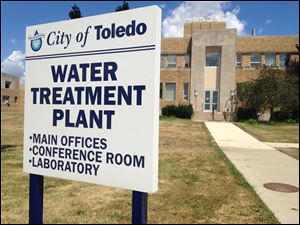
Forward progress on water
8/22/2018
Voters will decide this November if Toledo will form a regional water commission.
In approving a regional water plan fashioned by the mayor, the Toledo City Council has moved Greater Toledo toward a system that is realistic and fair.
The new plan — if approved by voters in November — should help dispel the distrust over water rates that has poisoned the city’s relations with its neighbors for so long. But the city of Toledo must show good faith and trust the structure it will now be constructing.
Toledo has not always shown good faith. In the past, water contracts have been negotiated that were unfair, and in some cases grossly unfair, to Toledo’s neighbors.
Click here to view more Blade editorials
The city’s competence has been understandably questioned as well. Toledo’s maintenance of the water system reached a low point when it was forced to issue a do-not-drink advisory for two days in 2014, after toxic algae invaded the pipes.
The Toledo City Council vote of 11-0, with one councilman absent, combined with the blessing of a self-appointed citizen group Protect Our Water, is a sign that voter approval of the Regional Water Commission is likely.
By creating the Regional Water Commission, Toledo is turning its back on the Toledo Area Water Authority, a plan that would have transferred ownership and control of the water system to an independent regional commission.
The collapse of TAWA generated bruised feelings among some of the suburban communities, Lucas County, and the Toledo Regional Chamber of Commerce. All of those groups participated for a year in negotiations with Toledo.
The participation of Toledo’s mayor at the time, Paula Hicks-Hudson, and a member of city council, now-Lucas County Treasurer Lindsay Webb, gave other members of TAWA the impression that the city of Toledo bought into the TAWA concept.
But, when it was time to actually commit to the plan, members of city council, for understandable political and legal reasons, did not want to give up control of one of the city’s greatest assets. Mayor Wade Kapszukiewicz, who, ironically, ran on a platform of supporting TAWA, saw the building opposition and went to work creating an alternative plan.
The alternative plan provides regional equality in rates and participation in governance, just as TAWA, was supposed to. It doesn’t change any of the ownership or financial liability of the water treatment plant itself, thereby saving millions of dollars in unnecessary expense.
But it offers all jurisdictions an opportunity to agree to a 20-year contract with equalized rates — and rates were the main thing that needed to be corrected — as well as a role in the governance of the system.
The water experts and public utilities administrators from the participating area jurisdictions will constitute the members of the commission, and they have already been meeting and working together for months to hammer out rates for retail, wholesale, and high-volume customers.
Under the plan, Toledo City Council will retain veto power over the commission, which it must exercise within 45 days after the commission sets rates. A veto must pass the council by a three-quarters vote. It is vital that this power be used wisely, and sparingly. Toledo City Council must respect the expertise, consensus, and will of the commission. If it does, this plan will work. It it does not, more ill will, dysfunction and ultimate separation will result.
Left on the table are the questions of a second intake in Lake Erie and a plan for water supply redundancy under emergency conditions. Those issue cannot be deferred forever.
If the voters agree to this plan, and the Toledo council is responsible in its application of it, the end result will be a regional water system that will work for the city and its neighbors.
The politics — pressure, push-back, and sincere dialogue — that occurred after TAWA was proposed, was to the ultimate betterment of the greater, regional community.
Sometimes the best politics makes the best policy.